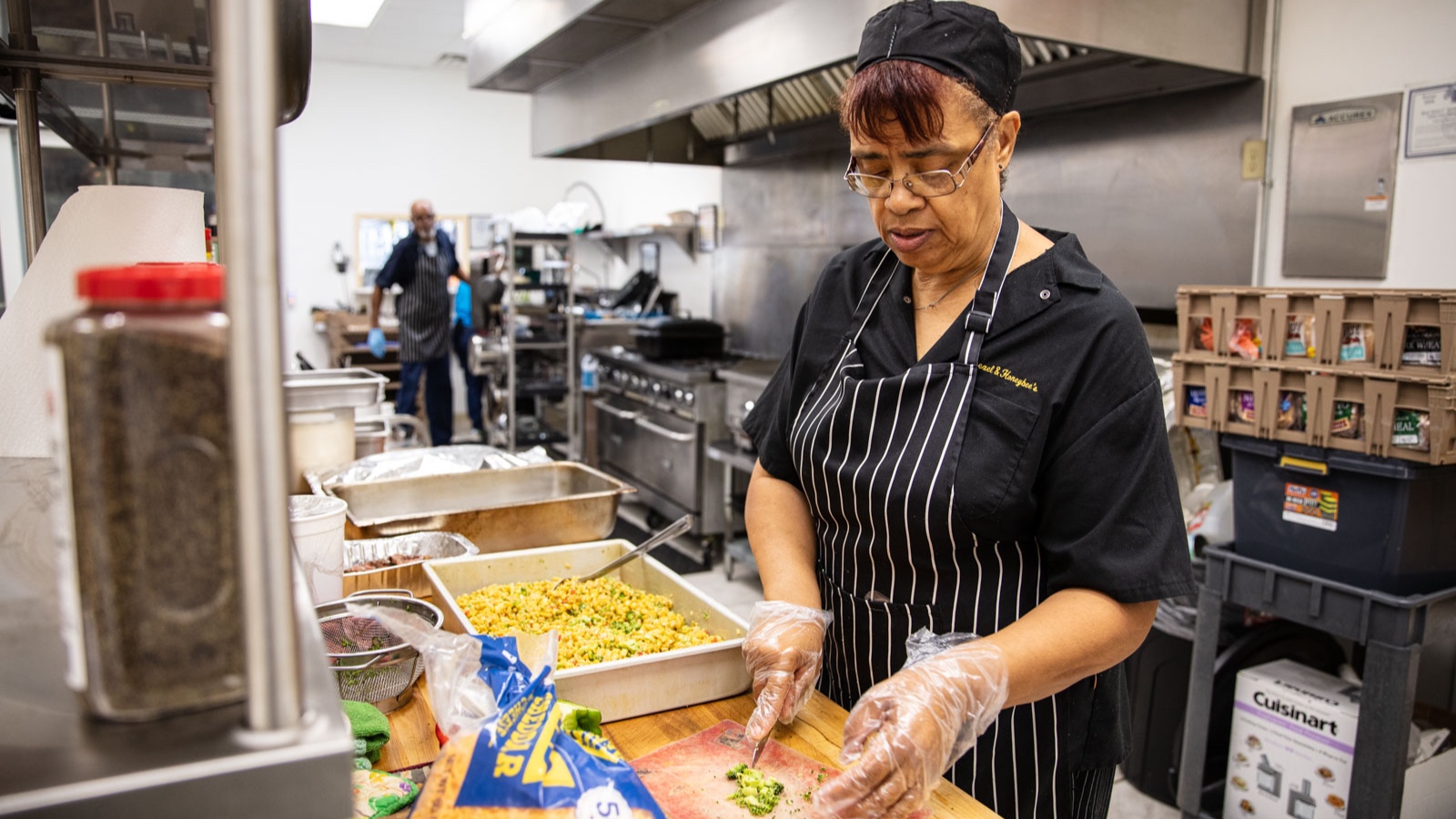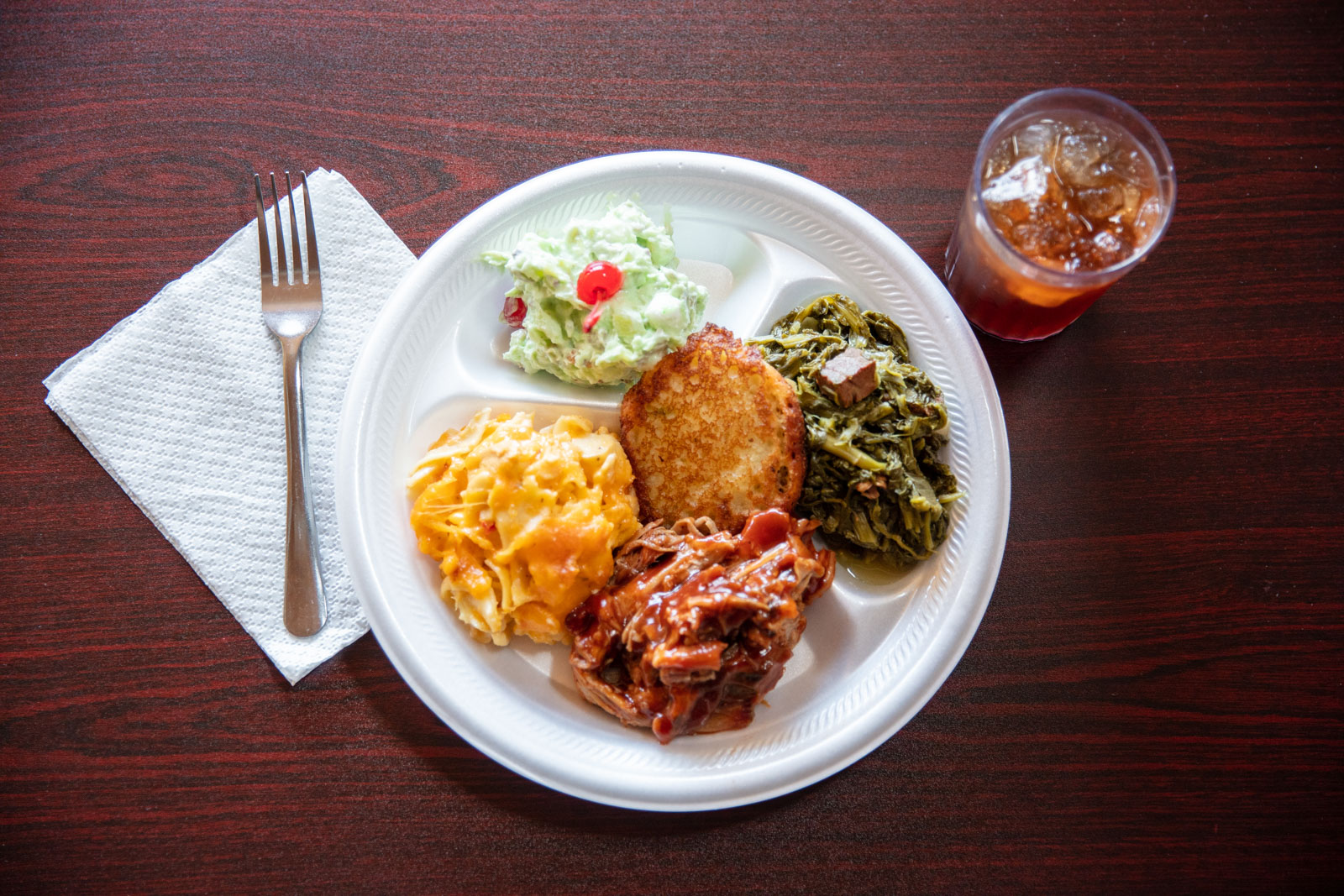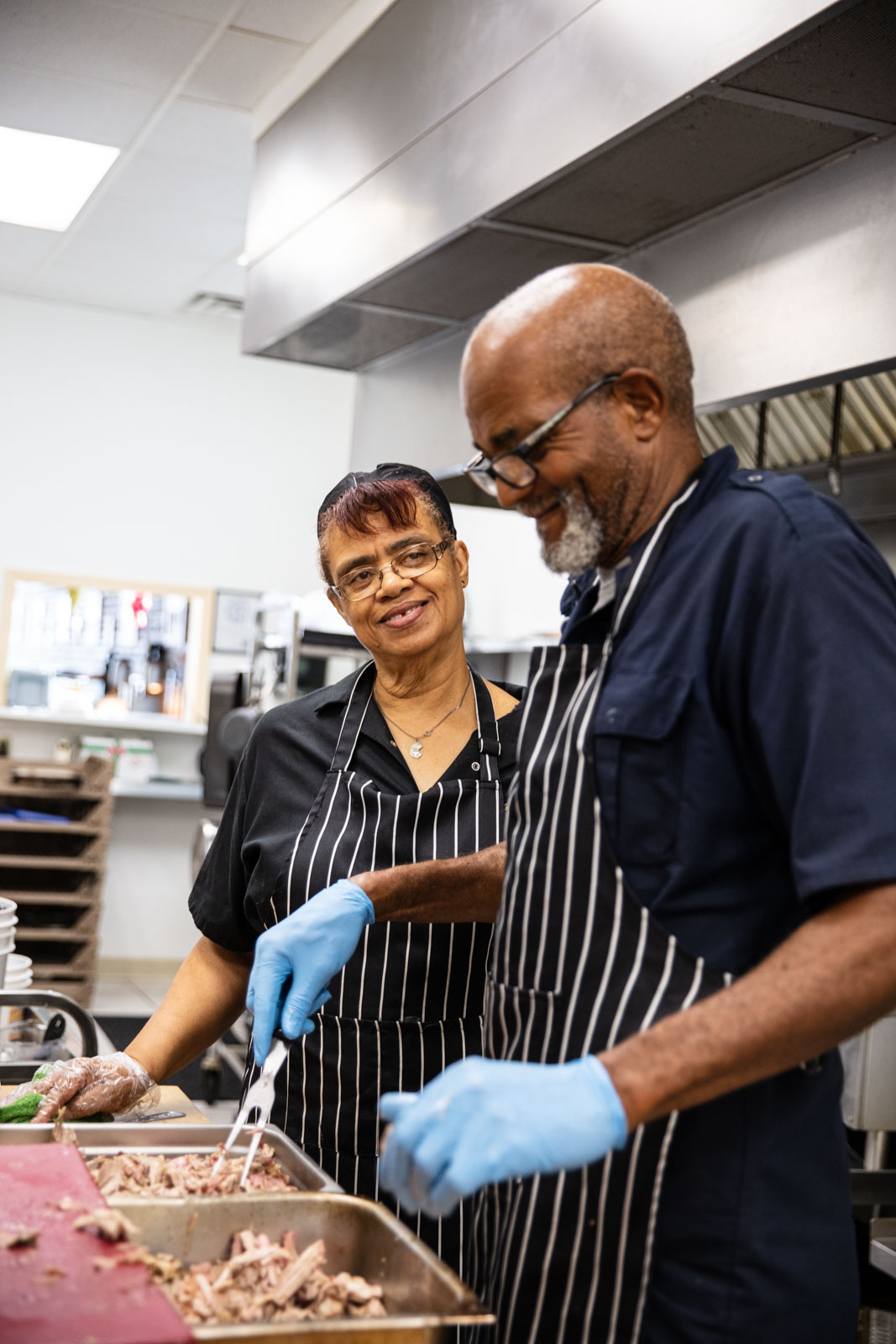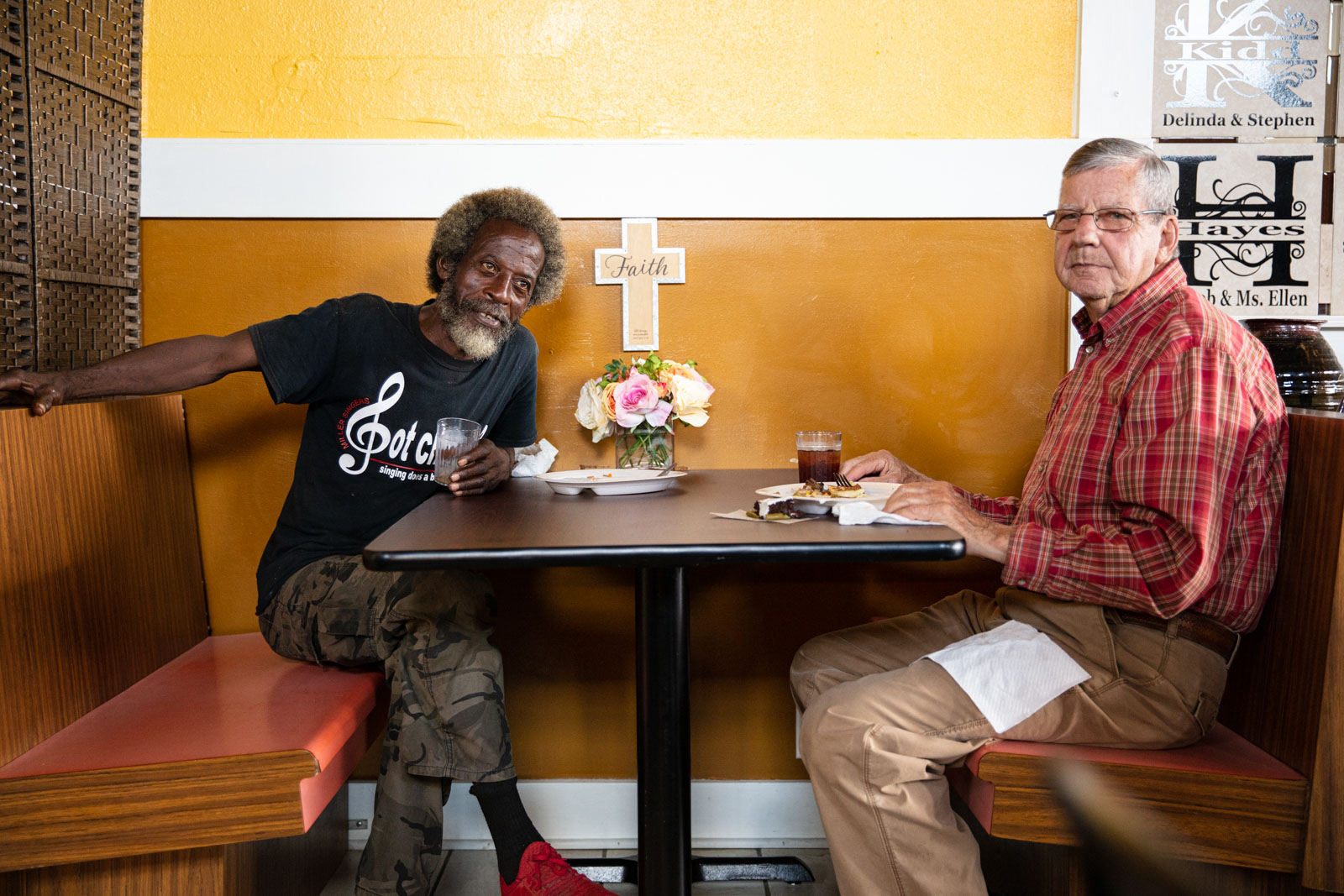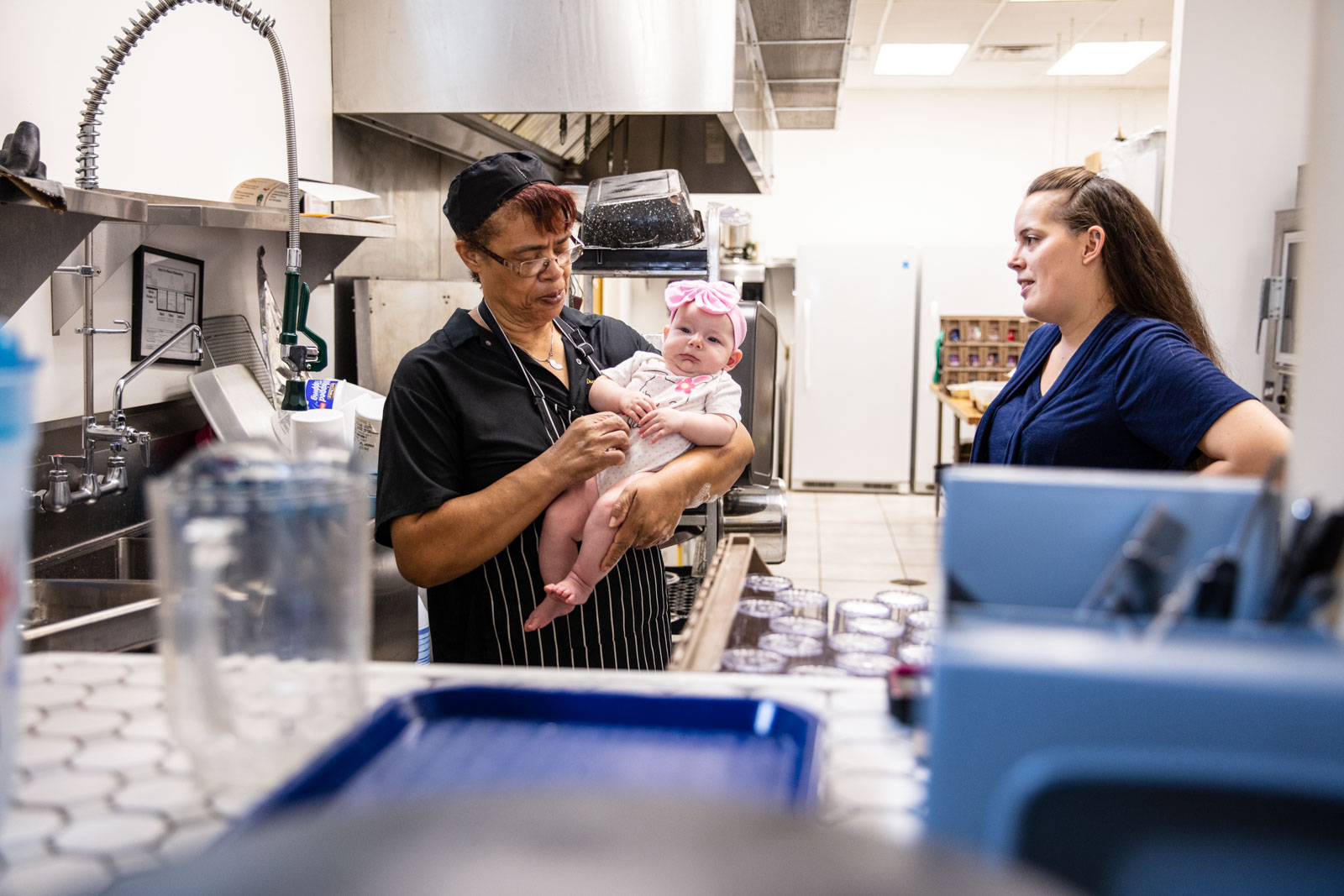Seventeen months ago, Lisa Thomas-McMillan and her husband Freddie opened a restaurant called Drexell & Honeybee’s in Brewton, Alabama. You’ll find the usual Southern favorites on the menu, but you won’t find any prices. You’ll walk away with a full belly — and a fuller soul.
“If you offer your food to the hungry and satisfy the needs of the afflicted, then your light shall rise in the darkness and your gloom be like the noonday.”
— Isaiah 58:10
One lady is tending a pot of diced white potatoes, watching them bounce as they come to a boil. Another is mixing a slurry of cornmeal and buttermilk flecked with slivers of green onion, while a third is hauling jugs of tea out front to the dining room, bumping the kitchen’s swinging door with her hip to make her way back and forth. Lisa Thomas-McMillan, the owner of this restaurant, Drexell & Honeybee’s in Brewton, Alabama, is slipping steaming skins off baked sweet potatoes to reveal flesh the color of a setting sun. The group’s laughter and chatter have fallen into harmony with the rhythm of stirring, chopping, and peeling. Add the room’s warmth and the scent of pineapple simmering down to a glaze for smothering ham, and for a moment the space has a tropical vibe.
It begins to feel less like a commercial kitchen and more like an informal party, like ladies at home preparing a feast for a big family, swapping advice and tips, with the matriarch pausing in mid-story to holler directions.
“Cindy, that’s probably enough on those potatoes,” Lisa warns. “They’re for potato salad, and we don’t want them mush.”
“Gotcha, Lisa,” Cindy Grissett affirms, moving the pot off the heat.
A family meal is more accurately what these women are fixing; the family is anyone and everyone in Brewton, and family is always welcome at Lisa’s tables. They have been since day one.
Lisa Thomas-McMillan opened her restaurant, Drexell & Honeybee’s, to “feed the need” in her hometown of Brewton, Alabama.
In March 2018, Drexell & Honeybee’s opened in a red brick building on the edge of downtown Brewton, about 10 miles north of the Florida state line. It’s unique in the small town (population 5,300), but not for its food or ambiance. You’ll find the usual suspects like meatloaf, fried chicken, veggies, mac and cheese, ribs, and other Southern favorites.
What you won’t find are listed prices. That’s because the rule at Drexell & Honeybee’s is “everybody eats.” When diners are done with their meal, they put whatever money they can — or not a single cent — in a box by the door. Drexell & Honeybee’s is a donations-only restaurant, one of only a handful in the state (and one of the only ones not run by a church). Every Tuesday through Friday from 11 a.m. to 1 p.m., it satisfies the stomachs of, on average, 100 people daily.
The restaurant is just the latest battle in a war on hunger Lisa has been waging for a long time. Her efforts have all the hallmarks of a calling: passion, devotion, determination, and the unshakable belief that good work makes a good difference. Yet Lisa admits it all came about quite suddenly and initially, with no clear vision.
“If you had asked me 25 years ago if this is what I’d be doing, I’d have said, ‘Naw,’” she says.
The sweet potatoes have cooled, and Lisa is mashing them in a metal pan, blending in some butter and then a few shakes of sugar and cinnamon. She pauses and dips a spoon in the pan and then quickly in her mouth.
“Needs more cinnamon!” she says, adjusting the black bandana on her head. “I’m gonna tell you I knew that even before I sampled it. After so long doing, you just know.”
The Brewton native has spent much of her adult life feeding others — waiting tables, working in hotel kitchens and in catering, where she learned and honed her skills — but that was to make money to feed herself. It’s what she was doing in 1994 in Los Angeles when a major earthquake shook her literally and figuratively.
“There had been a few in a row, and I thought, ‘That’s it! I’m going home,’” she says. The return to her roots reawakened the giving spirit her parents had nurtured in her as a child, despite their meager means. She grew up with her family of 14 packed into a six-room house her father built. From the age of six, she spent her summers picking cotton in unrelenting heat.
“We didn’t have much, but we always found a way to help others with even less,” Lisa says. She remembers a childhood friend telling her she didn’t even know what cheese was until Lisa’s mom gave her some. Her father worked three jobs but spent his scant free time in the woods hunting, always trying to bag enough game not just for his family, but for the neighbors, too.
“Them always looking for ways to do for others stuck with me,” Lisa says.
Lisa at work in the kitchen of Drexell & Honeybee’s.
Not long after her return to Brewton, a mundane moment turned out to be life-changing.
“An old lady in front of me at the grocery checkout had about $12 of items, and she couldn’t pay for them,” Lisa says. “She was standing there, digging in her purse, trying to scrape together enough.”
Lisa didn’t think; she acted. “I told her, ‘I’m going to pay for that,’” she says. The lady put up a few feeble yet heartfelt protests, but noting the growing line behind them, accepted Lisa’s help. After paying for the lady’s and her own groceries, Lisa felt moved to do more. “I was like, ‘Wow. She can’t afford $12 of food, and if you don’t have that, you really are doing without.’”
Lisa ran to the parking lot after her and asked the woman if she had this issue a lot. She said she did, and so did some of her friends. Again, Lisa leapt before she looked. She asked if the woman would share these friends’ names. She gave Lisa a list of 27 senior citizens. Lisa contacted them and then began cooking breakfasts for them in her house every morning.
“I don't know what made me do it, but I was going to help these folks,” she says. She’d pack up the food, go to Burger King, get 27 coffees, and deliver it all to 27 homes before she went to her job as an insurance agent.
For months, her breakfast operation subsisted on nothing but the recipients’ gratitude, but it was becoming difficult to do so much from her home kitchen and out of her own pocket. She knew she needed a commercial kitchen. She got a deal on a rundown building: six months rent-free if she fixed it up. She named her new spot Drexell & Honeybee’s, a name she’d come up with when she was still in California.
“It doesn’t mean anything. I just liked the sound of it and thought it would be a nice name for an ice cream shop,” she tells me as she roots through a rack of hot sauces. “When I was younger, I wanted to have an ice cream shop.”
The restaurant, situated on the edge of downtown Brewton.
In addition to feeding needy seniors, she opened Drexell & Honeybee’s up as a restaurant for the general public, offering lunches for $3 a plate, thinking she could help others, too, by providing cheap, tasty meals. It didn’t take long for reality to come calling.
“Of course, I was making no money,” she said. “That was OK by me, except for the fact that I had rent and utilities to pay, and food costs kept rising.”
A friend suggested she reach out to the food bank in nearby Mobile. A conversation with folks there introduced her to the intricacies of the nonprofit world. She realized if she wanted to continue making meals for the needy and wanted to use food bank supplies to help her do it, she’d have to create her own nonprofit. So, she did.
In 2002, she closed the restaurant. With the assistance of the local library and an attorney friend, in a few months, Lisa had her 501(c)(3). She created a small food bank for Brewton, supplied by the Mobile food bank and other donations, and used the food to nourish the area's poor and elderly once again. She called it Carlisa, in honor of a friend who’d recently passed. She built a basic structure with a storeroom and kitchen in her backyard and was soon cooking almost 100 meals a day and delivering them as far as 40 miles away.
“I was back doing what I knew I was supposed to do,” she says.
She did it for three years, and in that time made two journeys to bring attention to issues she encountered in her work. In 2003, she wrote a letter to Alabama Governor Bob Riley outlining her area’s hunger problems and walked the 105 miles to Montgomery to hand-deliver it. In 2005, she wrote a similar letter to President George Bush and walked 900 miles from Brewton to Washington, D.C., in a trip that took 54 days. She didn’t get to see either man.
“But I completed what God laid on my heart,” she says.
On her return from the D.C. walk, Lisa’s focus on the elderly was widened when she took a job at the local community college’s student center.
“I was running the nice new kitchen they had, and they were fine with me using the facilities to make meals for my seniors, too. It gave me the space I needed to better serve them,” she says. But she soon noticed many of the students scrounging change to get a pack of crackers from the vending machines instead of buying meals from her.
“These students were hungry; they were doing without to pay for school and books,” she says. She began offering “no cash, no problem” meals, getting donations, and often augmenting with her own money, just as she’d done to feed her seniors. With this experiment, the idea for the Drexell & Honeybee’s of today began to take shape.
Drexell & Honeybee’s opens at 11 a.m., and I offer to help with final prep since I fear my questions have slowed Lisa down. She waves a hand and huffs at the notion but gives me a broom to sweep leaves away from the front door. Walking through the empty dining room, I wonder, what will look like in 20 minutes. With its wood-panel ceiling and an exposed brick wall, it could be a trendy café. Booths line two sides; four-top tables are scattered in between them. A few of Lisa’s artworks — scenes rendered in paint and textiles — add bright color. Outside, I see a mix of cheery spring flowers spilling over large planters framing the entry. I pause at the donation box by the door; it’s shielded by two screens to ensure whatever slides into its little slot remains the knowledge of each individual solely. Above it is a painted board with a Bible verse, Matthew 18:20: “For where two or three gather together in my name, there I am in the midst of them.”
While Lisa avoids preaching, faith’s role in her story is obvious. Some might say she stumbled upon her current location and call the circumstances that made it available good luck, but Lisa believes God guided every step.
“It was time to go bigger with what I was doing, and then I found this place,” she says. A string of what Lisa calls “heaven-directed” events allowed her and the man she had recently married, Freddie McMillan, to buy the building and transform it into the second coming of Drexell & Honeybee’s, using credit cards and Freddie’s pension from the Marine Corps to fund it and doing much of the work themselves.
Freddie and Lisa at work in the kitchen of Drexell & Honeybee’s.
This time, Lisa tweaked her business model, thinking back to the community college.
“Before, I thought I was doing right to sell meals for $3, but I learned that even that is too much for so many,” she says. Since that small sum never covered her costs anyway, she decided Drexell & Honeybee’s wouldn’t try to be a business at all. It would feed anyone and everyone for whatever they could afford to pay, even if they had not a penny.
In March 2018, the first guests arrived to eat at the new restaurant, and according to Lisa, the group then resembled the crowd I see forming outside. News of today’s menu — glazed ham, fresh peas, potato salad, collard greens, sweet potato casserole, and cornbread — has spread. Two men are first in the door. Both are middle-aged, one black, one white, with the white man carrying clothes and other possessions in a grocery sack. Next through the door is a group of young women, one with an infant. More follow; all ages and races get in line. Judging by the only evidence of socioeconomic status I can see — clothes and cars — the crowd includes all levels of wealth, right down to no wealth at all. The quiet room instantly comes alive with sound: “how you’s?” and other chatter, forks scraping, ice cubes rattling in plastic cups of tea.
Robert Simmons is the first to sit down with his food and lets me join him at a booth as he digs into the sweet potatoes. I’m picky about sweet potatoes, so I ask how they are.
“Best I’ve had in a while,” he says. He keeps eating while bragging on Lisa’s other dishes. “The corned beef, the bread pudding, the blueberry cobbler. It can’t be beat.” I start on my own meal. The ham is smoky and pineapple-kissed, the greens are silky with a punch from pepper vinegar, and the sweet potatoes surprisingly to my liking (I had been suspicious of the extra cinnamon). I ask Robert if he thinks the restaurant is helping people.
“Absolutely,” he says. “A good meal in a nice place like this could make all the difference for somebody. You just never know.”
He’s right. He takes his time eating, and I watch others who came in after him finish and leave, noting those stopping by the donation box and those heading straight to the door. The ratio is about 3 to 1, with every person I assumed might have nothing to give putting something in the box and at least one suit-and-tie bypassing it altogether.
Robert Simmons has been coming since Drexell & Honeybee’s opened, but others in Brewton were skeptical at first.
“Honestly, when people first heard ‘you can eat for free,’ a lot thought there was a catch,” David Kyles, Lisa’s brother-in-law, says, making short work of his potato-salad mountain. “I mean who’d ever heard of such a thing?” Now, most of the talk he hears is about the food. “The word is out on how delicious everything is and the nice atmosphere,” he says. “That’s bringing people in from other towns.”
For Dale and Sam, a retired couple from Massachusetts who moved to nearby Castleberry four years ago, Lisa epitomizes the Southern hospitality that drew them down here.
“This is loving your neighbor,” says Dale. She and Sam have lunch at Drexell & Honeybee’s several times a week and have been struck by the diversity. “Every kind of person is in here,” says Sam. Dale nods to an elderly man moving slowly toward the booth behind her with a plate piled high. “He’s a regular. He had a stroke a while back and can’t work. He has no family here. I think this might be all he eats each day.”
The youngest diners so far (other than a few babies and toddlers in tow) arrive around noon, a couple of boys in T-shirts and athletic shorts. On a rare moment out of her kitchen, Lisa spots them and rushes over to say hello. They’re both on baseball scholarships at the community college where she once worked, and though she left before they arrived, she’s obviously thrilled that she can still help local students.
Drake Wright, a freshman, and Devin Foreman, a sophomore, are quick to express appreciation.
“It takes some of the financial burden off of us,” Drake says.
“Plus, it’s real food. I was eating a lot of fast food before,” Devin says.
The boys know that by comparison, they are pretty lucky. “This is helpful for us, but for others, it’s essential. There are people who would go completely hungry without it,” Drake says. Devin points to his plate. “This is all good. Lisa could be cooking this and make real money, but her heart is for this.”
In Lisa’s heart, there is no room for judgment. She doesn’t question or even wonder why anyone might be at a point in their lives where they need Drexell & Honeybee’s. She never watches the donation box.
“Sometimes, somebody I know will snitch, telling me, ‘Lisa, you know who was in here, ate up a whole bunch, and didn’t put a dime in the box?’ I say, ‘No, and I don’t want to.’ Do you know how crazy I’d go if I tried to keep tabs on that? That’s not what this is about.”
The donation box was designed to keep Lisa — and others — out of it.
“You could drop $1,000 in there, and I would not know,” she says. “You could drop a quarter in there, and I would not know. And there’s a chance you could give so much more than that quarter, but there’s also the chance that a quarter is everything you had left.”
Her diners aren’t always as open-minded. I watch whispers and sideways glances move like a wave through the dining room when certain folks show up. A man reeking of stale smoke and booze-soaked sweat who’s talking too loudly. Some rowdy teenagers on their phones who clean their plates and rush out.
Human nature is tough to kill, even when a river of compassion tries to drown it.
There’s a short lull before a second crowd arrives. Cindy is dishing out hearty portions, pausing to ask every person if they prefer the potato salad with or without onions. No matter how they feel about that, they’d better be OK with paprika. Earlier, her sprinkles of the rusty dust across the top of both batches were heavy-handed.
“Lisa likes everything to have some color, and potato salad can look a little drab,” Cindy explains. “Presentation really matters to her. And so does quality. When we make blueberry cobblers [with the fresh berries Brewton is famous for], she always reminds us to take real care not to let any berry stems in the mix. She tells us, ‘They don’t taste good, and our food tastes good!’”
Drexell & Honeybee’s is taking at least a small bite out of the area’s poverty problems (and there are plenty of them; Brewton sits in Escambia County, one of Alabama’s poorest), but it’s also feeding more than physical hunger in a way shelters and soup kitchens can’t. Because Drexell & Honeybee’s feels and basically operates like any other restaurant, emphasizing quality and presentation in an inviting atmosphere, it’s also satiating the innate desire for dignity.
“Everyone wants respect; everyone wants to be acknowledged and valued; we owe others at least that,” Lisa says.
The connections formed at the restaurant are equally crucial.
“I want these different folks in this space together,” she says. “I want them interacting. Doing it over food makes the fellowship more natural.” The fellowship is so important to Lisa that she stopped offering to-go orders. And this communion is opening eyes, showing those in Brewton who have how many there are who have not.
“I have seen this community really come together to support Lisa and this place,” says Brewton native Janie Chamberlain. “When you come in here, you get a better idea of the need here; that’s something I think people have not been aware of. That may be the most far-reaching impact of this generous work.”
Cindy Grissett says divine inspiration and her love of cooking motivated her to join the staff at Drexell & Honeybee’s. “The Lord put this place on my heart,” she says.
Thanks to some statewide media coverage that the restaurant’s first anniversary garnered, Lisa’s generosity is becoming known beyond the city. But there is one thing that Lisa will not share, much to the chagrin of a favorite customer, 82-year-old Mary Weaver.
“She cooks so much better than me, I’m begging for the recipes,” Mary says.
“No. No. You already know I don’t give those out,” Lisa says.
Mary often donates groceries to the restaurant, even though Lisa tells her not to. “She’s on a fixed income,” Lisa says in an aside to me that Mary easily overhears. Mary puts a hand on her hip and retorts: “Everyone who can help, should. I can help.”
To continue, Drexell & Honeybee’s needs all the help it can get. The building is paid for, but utility bills come monthly, and there are still renovation costs to pay off, plus the ingredients for each day’s lunch. Freddie’s pension helps underwrite much of Drexell & Honeybee’s expenses while also keeping a roof over his and Lisa’s heads. But the restaurant depends on the money in the box, in-kind services, and other donations. Small gifts add up, too. Lisa flings open the door of a large freezer to show off such gifts.
“We’ve been getting so many veggies from local farmers and backyard gardeners,” she says, “I’ve had to get a lady in here just to help get them cut up and get them put up.”
The last guest is gone, and I’ve got a broom again, corralling crumbs of cornbread and stray black-eyed peas into piles destined for the dustpan. Lisa comes out from the kitchen, locks the front door, and takes the donation box off the wall. She opens it and dumps the day’s take on the table. She counts silently while I sweep.
“$165.39,” she announces. It was a good day, but not the best. “Some days we make $40, and that doesn’t even cover the food. And then, sometimes I look in there and there are five $100 bills, so right now, at least, it is evening out.” Like manna, the pleasant surprises always seem to come when most needed.
When I ask if she thinks she’d take in more if she put suggested prices on the menu (as some other donation-only restaurants do), she’s emphatic.
“No, no. I will not do that,” she says. “Let’s say you are poor and hungry, and you’d really like a ham sandwich, and it says suggested price, $6.99. I actually don’t think you’re going to come in here at all because you don’t want to be spotted saying, ‘I can’t pay that.’ You can run people off with that,” she says. “Some people who operate some of the other restaurants might not understand because they’ve never been poor, but I have been. I know the pride of the working poor.”
If you find yourself in south Alabama near Brewton around lunchtime, and you pop into Drexell & Honeybee’s to eat, you’ll find a warm welcome and heaping helpings of Southern-comfort classics. When you’re done, Lisa hopes you leave full and happy. She hopes you had some enjoyable conversation with the other folks gathered. But her number one wish for what you take away is the parting thought she gives me along with a tight hug as I leave.
“Years ago, I met an old, old man on the outskirts of town and realized he had no refrigerator. It was 100 degrees in the shade, and I was worried about him having no cold or even cool water to drink,” she says. She couldn’t afford to buy him a fridge, but she got him a cooler, loaded it with ice and water and juice, and kept it filled for months. “The day I met that man, I had bought a new pair of shoes. When I got home and saw those shoes, it bothered me. There are people right next to me who have nothing, not even a cool drink on a scorching day,” she says, blinking back tears. She knows the money she paid for those shoes wouldn’t have bought a fridge, but she dug for deeper meaning in her uneasiness. She uncovered a message that hit her hard, and it’s this she most wants to pass on.
“Don’t ever let your wants override someone else’s needs,” she says. “And God’s gonna put needy people in your life to test you. Don’t fail.”
Lisa’s getting top marks in that regard, but how much difference is Drexell & Honeybee’s making when it comes to food insecurity? There’s little doubt it’s helping people. The evidence is found folded up and scattered among the change and bills in the box.
“We get ‘thank yous’ all the time. One scribbled note from a man said if not for us, he and his family would not have eaten that day,” Lisa says. “I believe that is true of someone here every single day.”
Perhaps the return on investment that’s most difficult to measure is the one that matters most: Drexell & Honeybee’s is proof kindness still exists in this often cruel world. When Lisa talks about beginning this work with no grand plan, I’m struck by a thought. She didn't need a plan. She simply made a choice, the choice to look beyond herself. It’s a choice that greets every one of us, every day. And when we make the right choice, it’s contagious.
“A young lady recently told me that what we’re doing here has changed her heart,” Lisa says. “And not because we’re feeding her, but because she’s now volunteering to help others. If I can do that with this? My goodness, that’s it! That’s the joy growing.”
The pursuit of joy has long motivated Lisa.
“I’ve learned the joy you get when you serve others,” Lisa says. “And don’t mistake it, joy is not the same as happiness. Happiness is fleeting; joy is something down in your soul.”
At Drexell & Honeybee’s, Lisa deepens the idea of “soul food.” She pours the joy from her soul into fried chicken, stewed okra and tomatoes, mac and cheese, and pork chops — only to find herself continually refilled.
“The more you do, the more you’re able to do, and the richer you become. Not with things or money. With love,” she says. “I don’t think nothing can top that.”
This story was updated on June 24, 2022.

